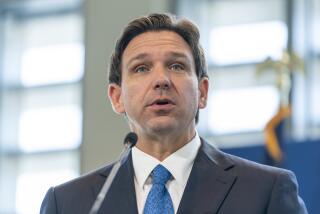Disney Had No Right to Deny Benefits to Executive, Jury Rules
- Share via
A Disney executive’s deathbed agreement to renounce $2.8 million in benefits to avoid being sued for allegedly taking kickbacks was declared invalid Friday by a federal jury.
After heated debate, the panel also found there was not enough evidence to prove that Disney Senior Vice President Robert Jahn extorted payoffs from vendors while he was in charge of producing movie trailers and television ads for the studio.
Jahn, 54, died of AIDS complications in May 1994, three weeks after he signed away his pension, stock options and deferred bonuses during a meeting with a Disney representative at Cedars-Sinai Medical Center.
“Disney had no right to deny Mr. Jahn those benefits,” jury forewoman Michele Antonaras, an accountant from Long Beach, said after the verdict.
Antonaras said the nine-member jury came close to declaring itself deadlocked because of a split over whether Jahn took payoffs. In the end, however, all jurors agreed the evidence was insufficient, she said.
Much of the production work for Disney’s movie trailers and TV ads was farmed out to independent vendors, one of whom testified that he paid Jahn more than $160,000 over several years to obtain lucrative contracts.
Sanford Litvack, Disney’s chief of corporate operations, testified that Jahn admitted taking about $60,000 in payoffs during a meeting in December 1993 at his Hollywood Hills home.
Litvack, currently No. 3 in the Disney hierarchy, said Jahn told him he wanted “to wipe the slate clean,” and surrendered what was left of the money, more than $10,000 in bills kept in a cigar box.
If that were true, Antonaras said, Disney should have obtained a signed confession from Jahn on the spot. She said the jury might have rendered a different verdict if that had been done.
The jury’s verdict specified no money award to Jahn’s estate, which brought the suit. That decision will be left to U.S. District Judge Dean D. Pregerson when he considers motions to be filed by both sides.
“This is a total victory for us,” plaintiffs’ lawyer Gregory Hafif said outside the courtroom. “Disney forced Mr. Jahn, who had only weeks to live and was weakened by this terrible disease, to do something he didn’t want to do, something he didn’t have to do.”
John Quinn, who represented Disney in the trial, also claimed victory, saying the verdict means that Disney owes Jahn’s estate nothing.
He based his opinion on the jury’s nonbinding answer of yes to the following question:
“Did Disney justifiably rely to its detriment on a promise by Robert Jahn to give up his nonmedical benefits?”
But Antonaras, the jury forewoman, said the question was ambiguous. She said the panel intended its response to mean that Disney surrendered any claims it might have against Jahn when it solicited his promise to renounce his nonmedical benefits.
Litvack testified at the trial that in exchange for Jahn’s agreement to give up his benefits, he promised that the studio would take no legal action against Jahn to recover padded billings Jahn had approved to conceal the alleged payoffs.
He said he also agreed not to say anything about the alleged kickbacks to Jahn’s mentor and boss at Disney, Jeffrey Katzenberg.
Attorney Larry A. Sackey, representing Jahn’s estate, charged that the kickback allegations were fabricated by a disgruntled music composer who was dropped by Jahn because of poor work.
The contractor, Hopkins B. Hallman II, presented Disney officials with copies of checks totaling $164,000, which he said he cashed and paid to Jahn in exchange for getting work over several years.
Sackey told the jury that Disney officials “took advantage of a weakened and dying man at the worst moment of his life” to get him to surrender his rights.
More to Read
The biggest entertainment stories
Get our big stories about Hollywood, film, television, music, arts, culture and more right in your inbox as soon as they publish.
You may occasionally receive promotional content from the Los Angeles Times.










